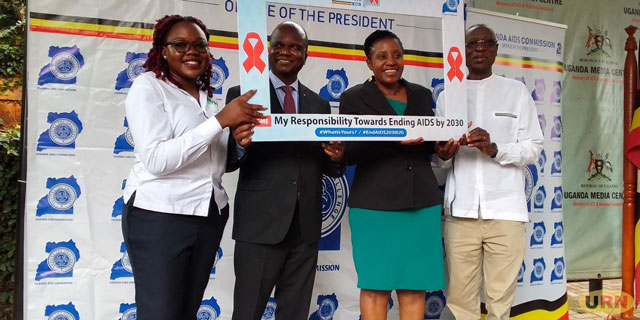
Kampala, Uganda | THE INDEPENDENT | As Uganda prepares to commemorate World AIDS Day on December 1st, the country faces a significant challenge due to the high number of new infections, posing a threat to the goal of ending the epidemic by 2030.
Dr. Nelson Musooba, the Director General of the Uganda AIDS Commission, addressed journalists at the government-owned media center, highlighting the country’s substantial progress. He mentioned that the epidemic has been reduced from 18 percent in the 1980s to the current HIV prevalence of 5.2 percent. Additionally, there has been a decrease in AIDS-related deaths from 94,000 to 17,000.
However, Musooba expressed concern over the persistently high rate of new infections, averaging 1,000 people per week, predominantly affecting young individuals.
Musooba emphasized that girls are disproportionately affected, with infection rates 3 to 4 times higher than those among boys, primarily due to trans-generational and transactional sex. He urged Ugandans to take a proactive role in combating the spread of the disease by knowing their HIV status and accessing accurate information about HIV and AIDS.
Musooba also highlighted an increase in enrollment in Anti-Retroviral Therapy (ART) among people living with AIDS. He stated that as of June this year, out of the estimated 1.433 million people living with HIV in December 2022, 1.4 million had enrolled in ART. He emphasized that increasing the enrollment in HIV treatment is crucial to suppressing the virus. Undetectable virus levels prevent transmission and new infections.
Jacqueline Makokha, the UNAIDS Country Director, underscored the importance of community leadership in the fight against HIV. She called upon the government and stakeholders to fund community-led programs aimed at scaling up the fight against AIDS.
Makokha emphasized the need to remove barriers to community leadership and create a regulatory environment that facilitates the community’s role in providing HIV services. She urged governments to ensure civil society has the space to protect the human rights of all, including marginalized communities, to effectively respond to the global HIV epidemic.
Dr. Steven Watiti, the former chairman of People Living with HIV, cautioned against complacency despite lower prevalence rates. He called for collective action to fight the disease if Uganda aims to end AIDS by 2030. Watiti highlighted the persistent stigma associated with people living with HIV, impacting their adherence to treatment.
He noted instances of self-stigma where individuals diagnosed with the virus refrain from disclosing their status to family members, resulting in non-adherence to medication. Furthermore, due to stigma, some individuals travel long distances to obtain ART to avoid being recognized, leading to poor adherence to treatment.
Ruth Awori, the Executive Director of Young People Living with HIV, pointed out the low levels of treatment literacy within communities, hindering their ability to lead in the fight against HIV. She highlighted the limited funding for the HIV response at the country level and the violation of human rights among those living with the disease.
“We know that through stigma and discrimination, many rights are violated, people living with HIV cannot access quality education because of discrimination in the school’s settings where they go and lack of supportive structures for adherence,” Awori stated. This year’s theme, “Let the Communities Lead,” will be observed with main events in Rakai district.
***
URN
 The Independent Uganda: You get the Truth we Pay the Price
The Independent Uganda: You get the Truth we Pay the Price




How can educated HIV+ people be empowered and facilitated by government to sensitize communities on HIV literacy?? Am available for that task.
Government should implement HIV/AIDS sensitization programs on radios and televisions.
We’ve diverted from the original norms and values of our ancestors” homosexuality is a major catalyst”